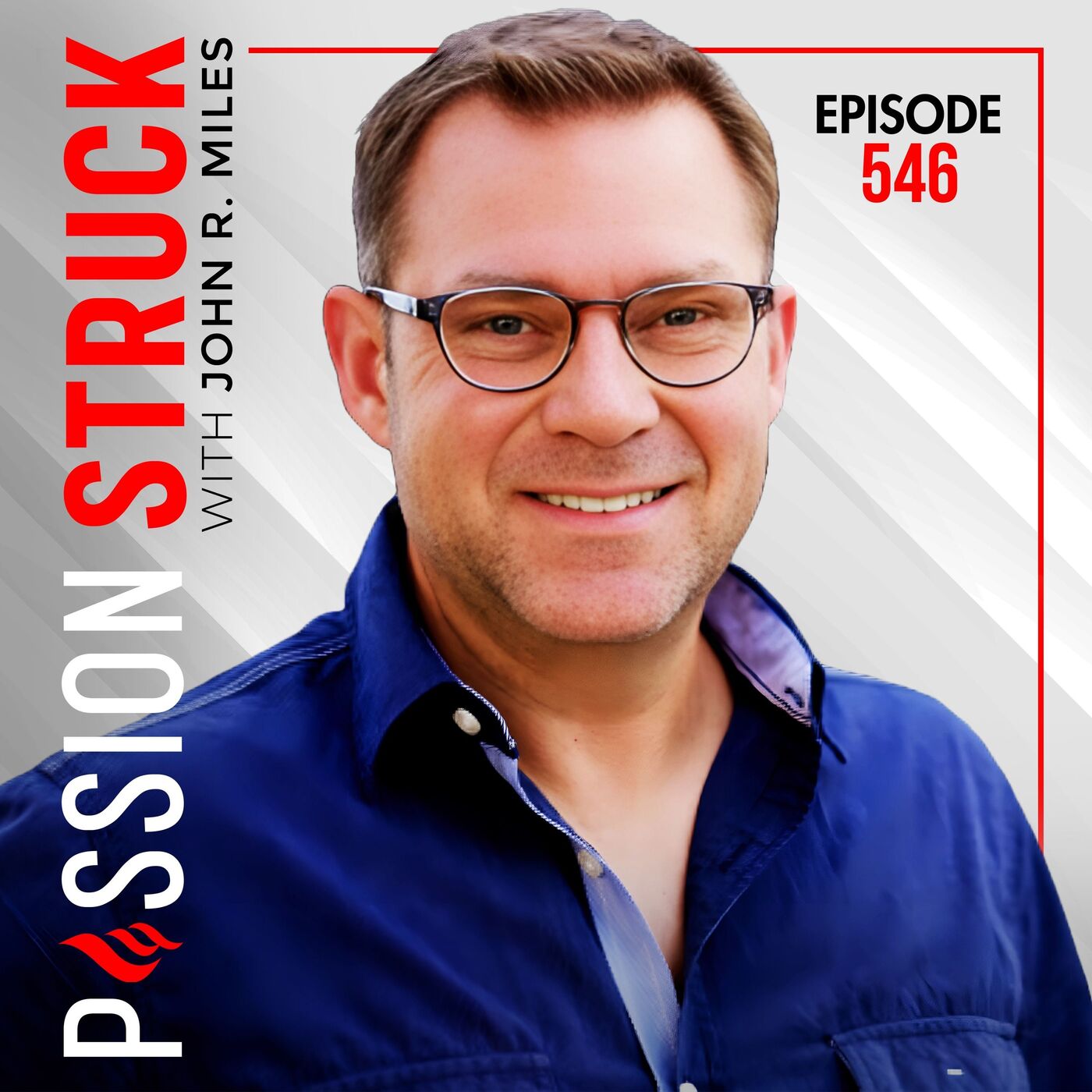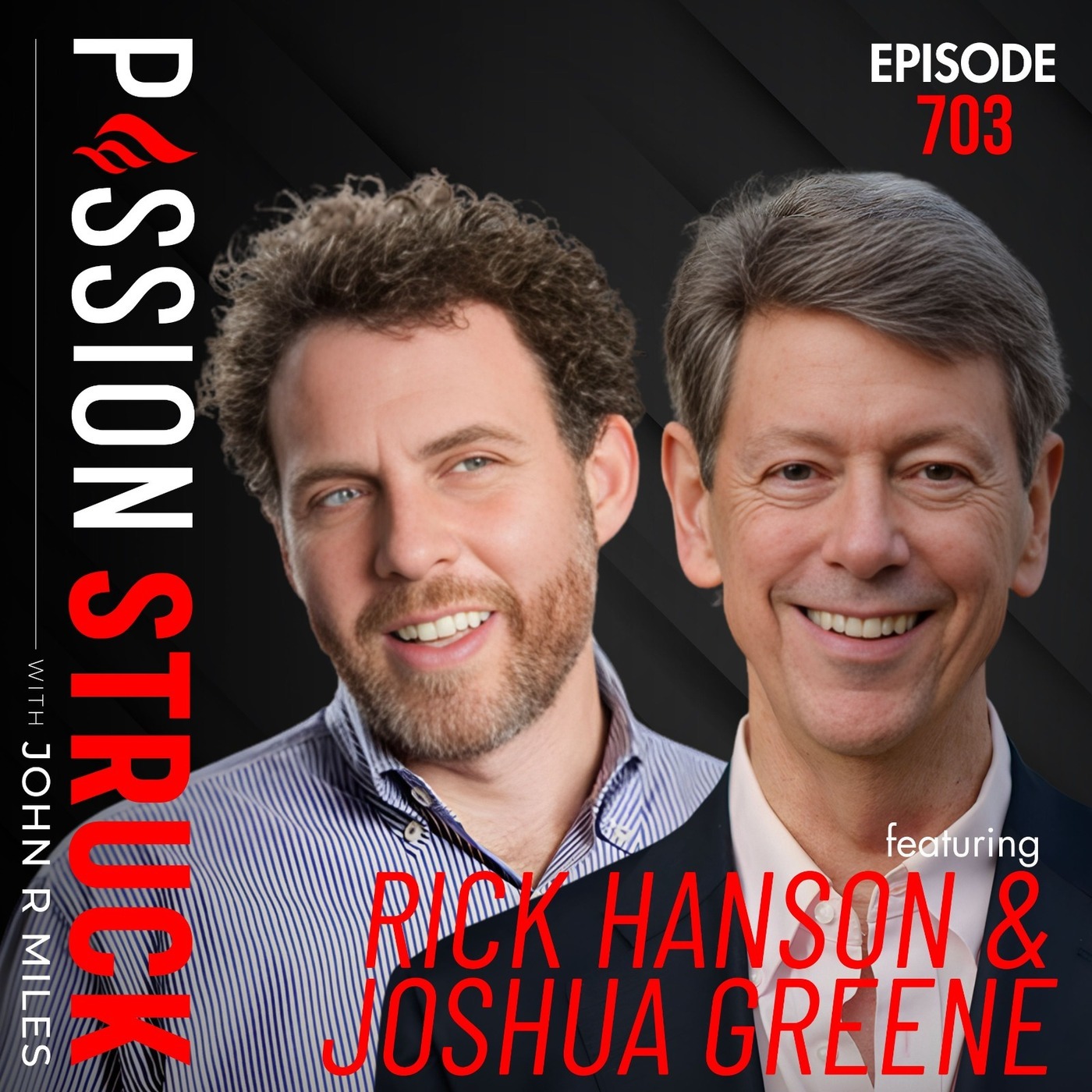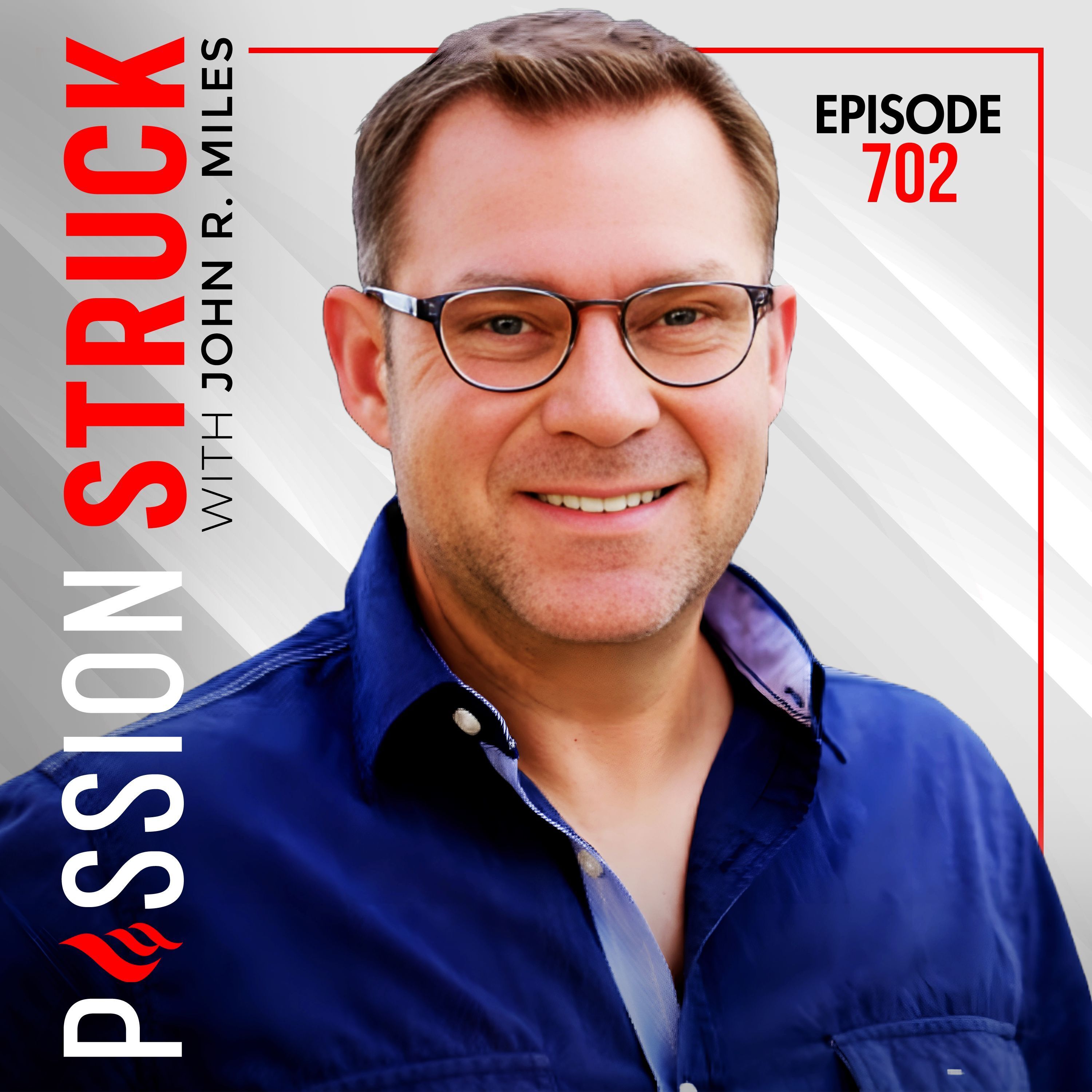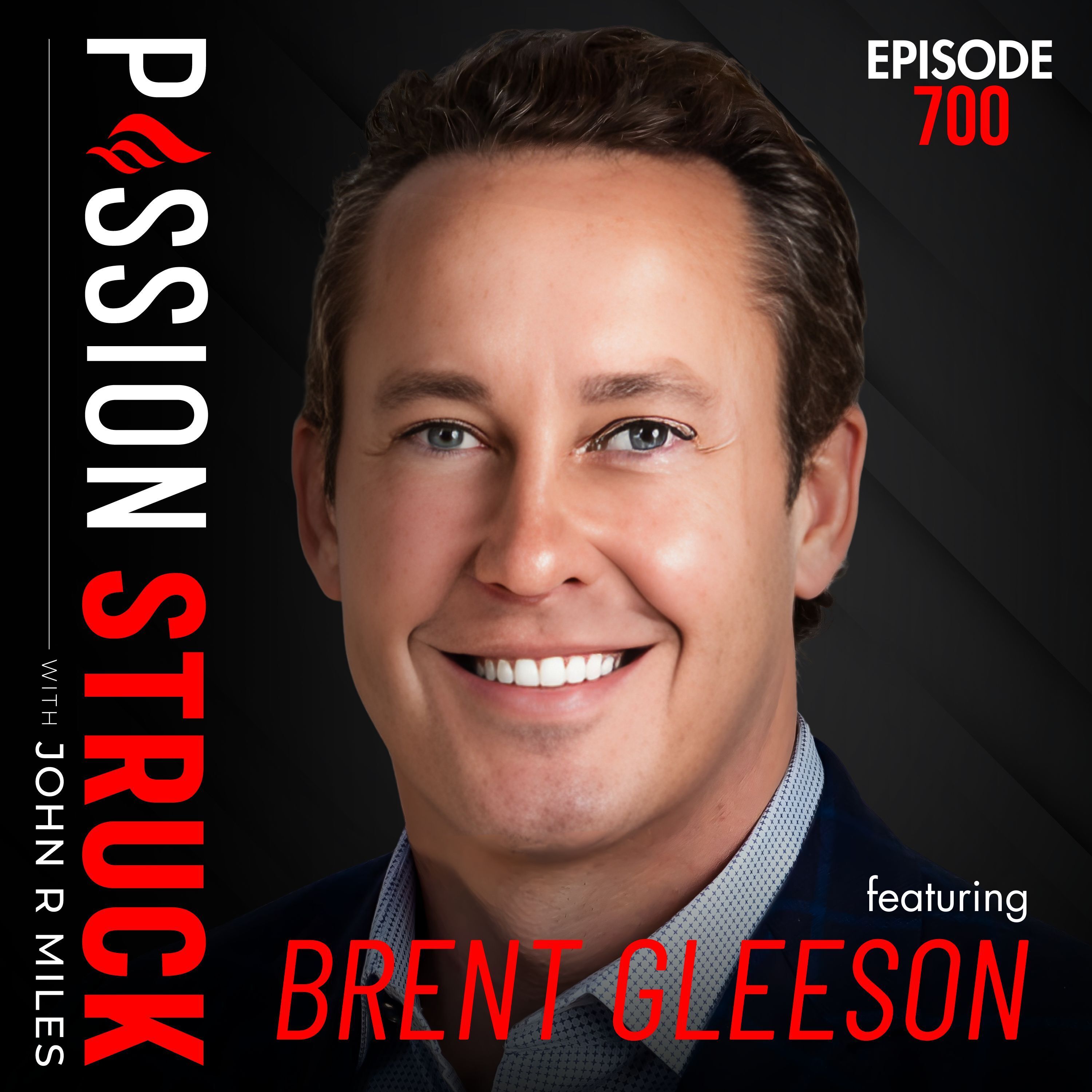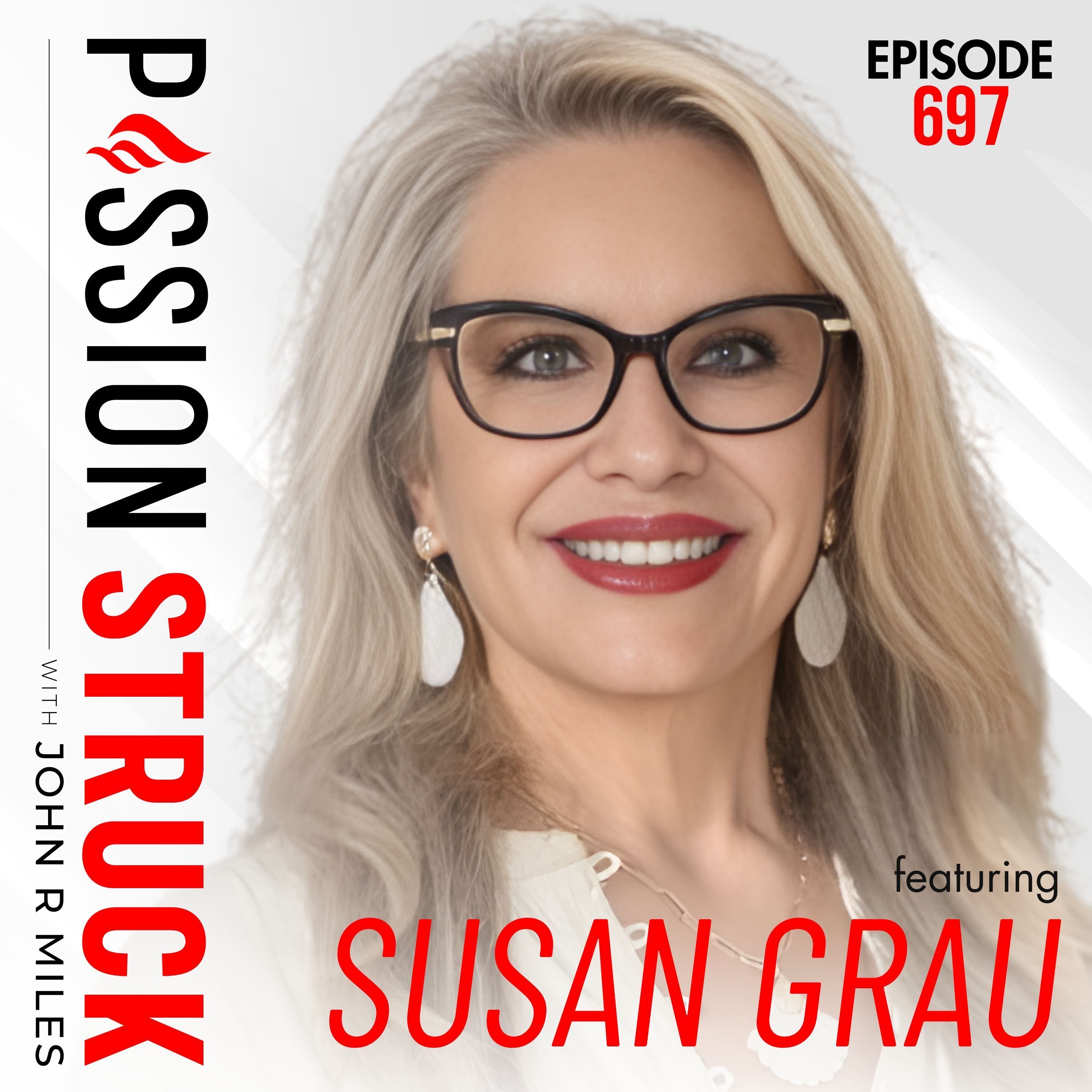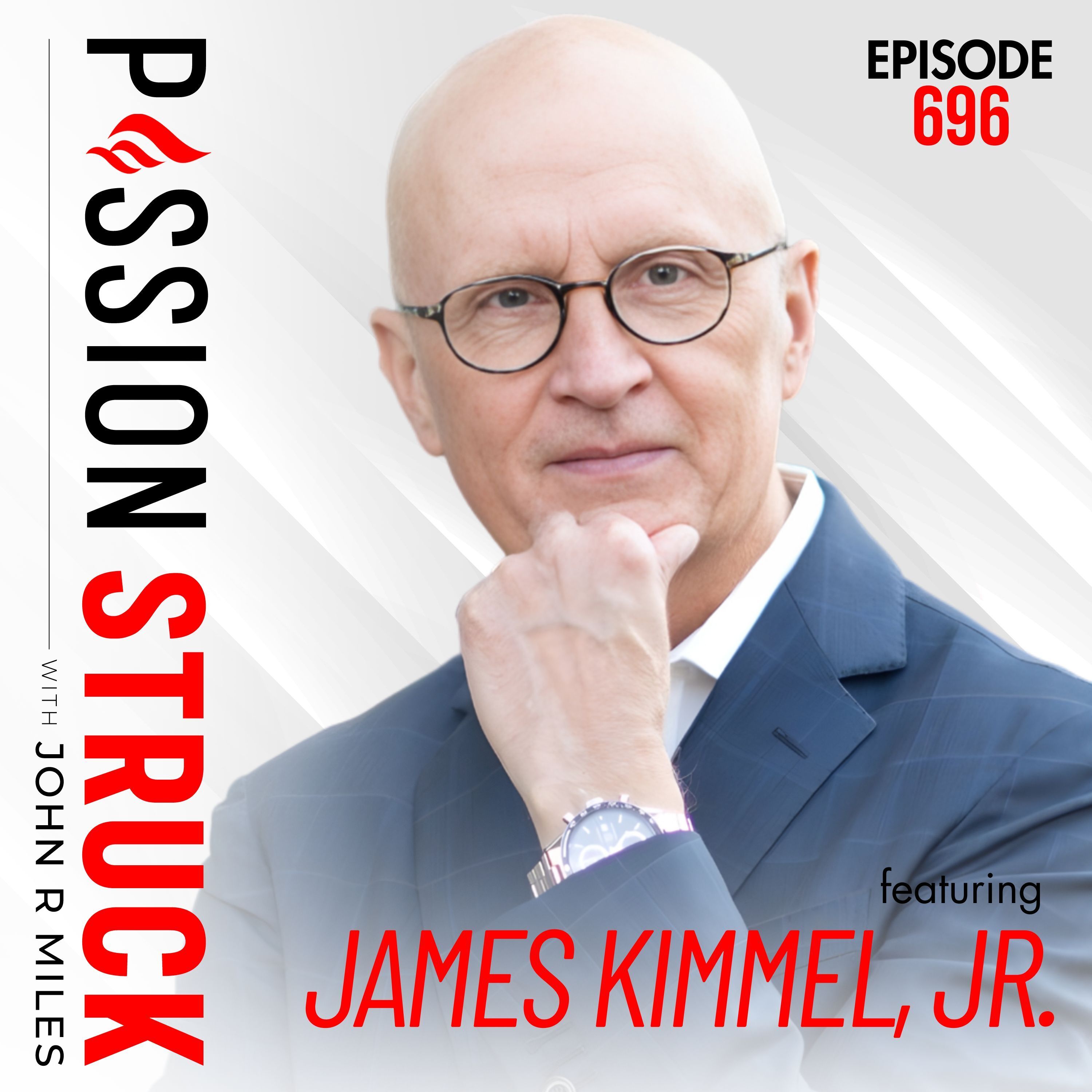The Art of Listening: How to Make People Feel Like They Matter | EP 546
Press play and read along
Transcript
Speaker 1 up next on Passionstruck, here's a question for you. When was the last time you actually shut up and listened?
Speaker 1 Not the kind of listening where you nod along while secretly thinking about what you're going to say next, but the real, uncomfortable, oh wow, this is vulnerable kind of listening.
Speaker 1 In today's episode, we're breaking down why listening is harder than it looks and why it's almost the most underrated superpower for building connection, killing loneliness, and maybe even figuring out your own messy life in the process.
Speaker 1
If you're tired of small talk and ready to get real, stick around. Welcome to Passion Struck.
Hi, I'm your host, John R.
Speaker 1 Miles, and on the show, we decipher the secrets, tips, and guidance of the world's most inspiring people and turn their wisdom into practical advice for you and those around you.
Speaker 1 Our mission is to help you unlock the power of intentionality so that you can become the best version of yourself. If you're new to the show, I offer advice and answer listener questions on Fridays.
Speaker 1 We have long-form interviews the rest of the week with guests ranging from astronauts to authors, CEOs, creators, innovators, scientists, military leaders, visionaries, and athletes.
Speaker 1
Now, let's go out there and become passion struck. Hey, Passionstruck family.
Welcome back to Momentum Friday and episode 546.
Speaker 1 I'm your host, John Miles, and I'm so excited to spend this time with you today. This space is all about exploring how we can live lives of intention, purpose, and meaning.
Speaker 1
And let me tell you, this episode is one you don't want to miss. If you're new here, welcome.
I am so thrilled you've joined us.
Speaker 1 You've just stepped into a community dedicated to helping you take bold, actionable steps toward the life you've always envisioned.
Speaker 1 Whether you're a longtime listener or a first-timer, This is a place where we turn passion into action. Before we dive into today's topic, let me tell you about this week's incredible episodes.
Speaker 1 On Tuesday, I sat down with Jessica Zwife, the founder of Simply Be and the author of The Light Work.
Speaker 1 We talked about the transformative power of authenticity and how to tap into your inner light to navigate life's challenges and opportunities.
Speaker 1 Then on Thursday, I had such a fascinating conversation with George Appling about aligning your actions with your values and finding clarity in your personal mission.
Speaker 1 It was an eye-opening discussion about discovering what truly drives you and using that knowledge to create a life of purpose.
Speaker 1 If you missed those episodes, I highly recommend going back and checking them out. They're filled with insights and actionable takeaways that can complement what we're talking about today.
Speaker 1 For those of you who are just diving in, don't miss our episode Starter Packs.
Speaker 1 With over 540 episodes, we've curated playlists on essential themes like leadership, mental health, and personal growth to help you jump right into the content that resonates most with you.
Speaker 1 You can find them at passionstruck.com slash starter packs or on Spotify.
Speaker 1 If you want to take what we discuss even deeper, I invite you to sign up for my Live Intentionally newsletter at passionstruck.com.
Speaker 1 Each week, I share insights, challenges, and strategies to keep you inspired and intentional in your journey.
Speaker 1 And for those of you who enjoy a visual experience, make sure you subscribe to our YouTube channel for episodes, insights, and highlights that will keep your growth journey dynamic and engaging.
Speaker 1 Now, let's dive in to today's episode. When was the last time you truly practiced the art of listening? And I mean really listening.
Speaker 1 Not the kind where you nod along while thinking about what you'll say next, but the kind of listening that makes someone feel seen, understood, and valued. Listening.
Speaker 1 Real listening is more than hearing words. It's a skill, an act of courage, and a way to connect that has the power to transform relationships.
Speaker 1 At its heart, listening is about creating space for someone else's story, whether it's their joy, their struggles, or their dreams.
Speaker 1 If you think about it, all of us have felt unseen or unheard at some point. Maybe you've spoken up and felt like no one really cared.
Speaker 1 Or maybe you've held something inside, convinced no one would listen, even if you did share. Those moments can leave us feeling isolated, like we're on an island by ourselves.
Speaker 1 But when someone truly listens, everything changes. Their attention becomes a bridge, one that connects us, reminds us that we matter, and fosters belonging.
Speaker 1 And when we listen really deeply, it's not just the storyteller who grows, it's also us, the listeners. Storytelling, and by extension, listening, is one of the most powerful tools we have as humans.
Speaker 1 It's how we make sense of the world, how we process our fears and dreams, and how we connect across divides. Today, we are diving into how listening fosters mattering, belonging, and intentionality.
Speaker 1 Three concepts that can transform not just the way we engage with others, but the way we live our lives.
Speaker 1 We'll explore the science, share some deeply moving stories, and leave you with practical insights on how to become a better listener. As you listen, I want you to reflect on this.
Speaker 1 What would happen if you fully embraced the art of listening? How could it deepen your relationships, dissolve feelings of isolation, and even heal the parts of yourself you've been holding back?
Speaker 1 The answer, I think, lies in the courage to hear and be heard. And that's exactly what we'll explore today.
Speaker 1 Thank you for choosing Passion Struck and choosing me to be your host and guide on your journey to creating an intentional life. Now, let that journey begin.
Speaker 1
So here's something I've been thinking about a lot lately. Earlier this week, I was chatting with Dr.
Allison Wood Brooks, the Harvard Business School Expert on the Art and Science of Conversation.
Speaker 1
This is for an interview that will come out on January 21st. And she said something that really stuck with me.
Every conversation is a chance to help someone feel seen or unseen. Think about that.
Speaker 1
Seen or unseen. It's such a simple idea, but it's loaded with power.
Now let me ask you something.
Speaker 1 When was the last time you walked away from a conversation and thought, wow, that person really saw me for who I am? It's rare, right?
Speaker 1 Most of the time, we're stuck in this pattern of surface-level exchanges. Small talk, polite nods, maybe the occasional, how are are you? That doesn't go much deeper than, I'm fine, thanks.
Speaker 1 But when someone really listens to you, when they lean in, make eye contact, and just get what you're saying, it's like oxygen. It reminds you that your voice, your story, your experience matters.
Speaker 1 I'll give you a quick story that brings this to life. A few months ago, I was at this event, kind of one of those gatherings where everyone's supposed to network, but no one really wants to.
Speaker 1 Anyway, I ended up sitting next to this older man, probably in his 70s.
Speaker 1 At first, he seemed a little reserved, reserved, but then he started talking about his childhood, how he grew up in this tiny, close-knit town that eventually disappeared because of a dam project.
Speaker 1
You could tell that he hadn't told this story in years, and all I did was listen. I didn't interrupt or ask him to get to the point.
I just let him unravel it, piece by piece.
Speaker 1 By the end of it, he looked at me and said, Thank you for letting me share that. I didn't even realize how much I needed to talk about it.
Speaker 1 What struck me wasn't just that he felt lighter after sharing his story, but how it changed me.
Speaker 1 Listening to him reminded me of of how we carry these pieces of ourselves that we think no one wants to hear. But when we share them and someone listens, we reclaim our sense of worth.
Speaker 1 Here's where the science ties in. Studies show that when someone listens to us, our brain releases oxytocin, the hormone that makes us feel connected and safe.
Speaker 1 It's literally like our brain's way of saying, hey, you matter. So here's my challenge to you this week.
Speaker 1 The next time you're talking with someone, whether it's your best friend, your barista, or even your boss, just pause for a moment and and really listen.
Speaker 1 Not the kind of listening where you're waiting for your turn to talk, but the kind where you're fully present. Because when you do, you're giving that person one of the greatest gifts imaginable.
Speaker 1 The sense that they're seen, that they matter. And honestly, you'll probably walk away feeling like you matter a little more too.
Speaker 1 All right, we're just getting started on this journey into the art of listening.
Speaker 1 Coming up, we're diving into belonging, how listening creates those powerful connections that remind us we're all in this together.
Speaker 1 So in that last section, I talked about how listening makes someone feel seen, but it goes even deeper than that. Listening doesn't just validate someone's story, it connects us, it creates belonging.
Speaker 1 But what does it really mean to belong? I've been really thinking about this and it brought me back to something from Louise Hay's mirror work.
Speaker 1 If you're not familiar, mirror work is the practice where you stand in front of a mirror, look yourself in the eye, and speak affirmations or truths.
Speaker 1
It's about seeing yourself, really seeing yourself, with all your fears, flaws, and strengths. But mirror work isn't just something we do alone.
It happens in our relationships too.
Speaker 1 Every time we deeply listen to someone's story, we're holding up a mirror to their humanity and to our own.
Speaker 1 That idea really hit home for me during a recent conversation that I had with Harry Buddha Magar. If you don't know his story, Harry is a former Gurkha soldier who lost both his legs in Afghanistan.
Speaker 1 That's only part of it. He went on to become the first double above knee amputee to summit Mount Everest.
Speaker 1 It's an incredible achievement, but what's even more powerful is what he's learned along the way. Harry showed me how how after his injury, he felt completely untethered.
Speaker 1 He'd lost not only just his legs, but also his sense of identity. He described it as looking into a cracked mirror, his reflection shattered, his sense of belonging nowhere to be found.
Speaker 1
But then something shifted. Harry started sharing his story with others, and people listened, and not just superficially, they really listened.
They heard his fears, his doubts, and his dreams.
Speaker 1 And in those moments, Harry said he started to see himself differently. It wasn't just that others saw his strength, it was that their reflections of him helped him see his own strengths too.
Speaker 1
Here's where it ties back to mirror work. When we listen deeply to someone, we're like that mirror.
We reflect back not just what they're saying, but who they are.
Speaker 1 And in doing so, we also start to see parts of ourselves, our resilience, our shared fears, our capacity for hope. The science backs this up.
Speaker 1 When we hear someone else's story and empathize, our mirror neurons, the part of our brain that helps us feel what others feel, light up. It's literally a biological reminder that we're connected.
Speaker 1 So what does this have to do with belonging, you might ask? When we step into someone's story, when we truly listen, we see their struggles and dreams are echoes of our own.
Speaker 1
Harry's journey of rebuilding after loss might not be the same as ours, but the themes are universal. And in those themes, we find connection.
Here's something to reflect on.
Speaker 1 When was the last time you truly listened to someone's story and saw yourself in it? What did it teach you about them and about yourself? Listening isn't just about being polite.
Speaker 1
It's about creating a space where both you and the other person can belong. And that's a gift worth giving every single day.
Next, we're diving into intentionality.
Speaker 1 How to make listening a deliberate act that can transform not just conversations, but entire relationships.
Speaker 1
So I've now talked about how listening makes someone feel seen and how it creates belonging by reflecting shared humanity. But let's go one step further.
Let's talk about intentionality.
Speaker 1
Because listening isn't just a passive act, it's a choice. It's purposeful presence.
And when we bring intention to listening, it transforms both the storyteller and the listener.
Speaker 1 I want to share a story about Bo Eason, a recent guest in episode 529. Bo is a former NFL player turned playwright and speaker.
Speaker 1 Bo tells this incredible story about how he was preparing for his one-man show. It's an intensely personal performance based on his life and struggles.
Speaker 1
And during rehearsals, he brought in a trusted mentor to help him refine it. Here's the thing about this mentor.
They didn't just watch and critique. They stepped into the story with Bo.
Speaker 1 At one point, they role-played a pivotal moment from Bo's childhood, something he hadn't fully processed yet. They didn't just listen to him recount it.
Speaker 1 They acted it out with him, asking questions like, what did that feel like? What were you afraid of? What were you hoping for?
Speaker 1 Through that intentional engagement, Bo uncovered layers of truth in his story that he hadn't realized were there. And because of that, his performance became more authentic, more human.
Speaker 1 But it wasn't just Bo Bo who grew from that experience. His mentor later admitted that by stepping into Bo's story so deeply, they learned something about their own childhood struggles too.
Speaker 1
That's the power of listening with intention. When we engage purposefully, we don't just hear the words, we allow the story to transform us.
Science has something to say about this too.
Speaker 1 Jamil Zaki, a psychologist who I had on the show and who studies empathy, talks about how empathy isn't just a trait, it's a skill. And like any skill, it grows with practice.
Speaker 1 When we listen intentionally, when we engage with curiosity and courage, we're exercising our empathy muscles.
Speaker 1 And that growth doesn't just help the person we're listening to, it helps us become more compassionate, more self-aware, and ultimately more human.
Speaker 1 So how can we bring this level of intentionality into our lives? It starts with asking better questions. Instead of sticking to, how are you? Or what's new?
Speaker 1
Try asking, what's been on your mind lately? Or what's a challenge you've been facing? Then go a step further. Be present.
Imagine yourself in their shoes. Roleplay it if it feels right.
Speaker 1 Intentional listening takes effort and courage, but the rewards are extraordinary. It's how we move beyond small talk and into real connection.
Speaker 1 It's how we show someone that their story has meaning, not just to them, but for us too. Here's something to think about as I wrap up this section.
Speaker 1 What would it look like if you brought this kind of intention to your next conversation? What might you learn, not just about the other person, but about yourself?
Speaker 1 Next, I'll dive into the reward of deep listening, what it means to witness someone's courage, and how it can bring healing to us both.
Speaker 1 So, we've talked about intentional listening, how stepping into someone's story with purpose can transform both the storyteller and the listener.
Speaker 1 But there's a reward for this kind of deep listening, and it's more powerful than you might think. We're not just hearing someone's words when we truly listen to someone's story.
Speaker 1 We're witnessing their courage, and there's something incredibly humbling about that. To sit with someone is they share a piece of their life, life, especially the vulnerable, messy parts.
Speaker 1
Takes us out of our own heads and reminds us of something universal. We're all carrying something, and we're all braver than we realize.
Let me share a story that illustrates this.
Speaker 1 There's this incredible program called the Dinner Party. It's a support group for people who've experienced significant loss, and the premise is simple.
Speaker 1 They come together to share a meal and their stories. One participant, I'll call her Sarah, lost her husband unexpectedly.
Speaker 1 She joined a dinner party gathering because she felt like no one in her life truly understood her grief. During the meal, she listened as others shared their stories.
Speaker 1
Stories of losing parents, siblings, partners. Some were raw and recent.
Others were wounds that had been scarred over but still ached. When it was Sarah's turn to speak, she hesitated.
Speaker 1
She admitted that part of her felt like her grief wasn't as valid as the others. But as she spoke, she realized something profound.
Her pain, her experience, wasn't isolated.
Speaker 1 It was part of a thread running through the entire room. And that's that's the reward of deep listening.
Speaker 1 As Sarah listened to the courage of others, to their honesty about their fears and their determination to keep going, it gave her strength.
Speaker 1 And when she spoke, when others listened to her, she felt less alone. Here's what's fascinating.
Speaker 1 Science shows us that storytelling, especially in groups, can lower stress and increase feelings of connection.
Speaker 1 Researchers like the late Emile Bruno have found that sharing and listening to personal stories reduces polarization and creates empathy even across divides.
Speaker 1
But beyond the science, there's something deeply human about hearing someone say, here's my truth in thinking. That sounds a lot like mine.
Deep listening gives us two gifts.
Speaker 1
First, it reminds us that courage isn't about having no fear. It's about moving forward despite it.
Hearing someone else's bravery lights a fire in us to face our own challenges.
Speaker 1
Second, it reminds us that we're not alone. Listening to someone else's story, even if it's completely different from ours, shows us the common threads we all share.
Love, loss, hope, survival.
Speaker 1
And in that realization, we find healing. Here's my question for you.
When was the last time you witnessed someone's courage through their story? How did it inspire you?
Speaker 1 And if you haven't done this recently, who in your life might be waiting for someone to really listen? Deep listening is more than an act of empathy.
Speaker 1 It's a bridge, a way to connect, to heal, and to grow.
Speaker 1 Next, we'll talk about how this bridge works in a broader sense, how listening can break through isolation and remind us that we're all part of something bigger.
Speaker 1 So we've now talked about how listening honors courage and fosters connection, but let's take it one step further.
Speaker 1 Listening doesn't just help us connect, it can pull us out of the isolation that so many of us feel in our lives. In a way, listening is like water.
Speaker 1
It's life-giving, and it has the power to break the fever of loneliness. Here's the thing.
Isolation isn't always about physically being alone.
Speaker 1 You can be surrounded by people and still feel like no one truly sees or understands you.
Speaker 1 I think we've all been there at some point, feeling disconnected, even when we're in the middle middle of a crowd. And here's where my conversation in episode 282 with Julianne Holt-Lundsted comes in.
Speaker 1 If you don't know her work, Julianne has done groundbreaking research on loneliness and social connection. She's found that loneliness isn't just an emotional experience, it's a public health crisis.
Speaker 1 Chronic loneliness, she told me, is as harmful to our health as smoking 15 cigarettes a day. It increases our risk of heart disease, depression, and even premature death.
Speaker 1 But, and this is where it gets hopeful, Julianne emphasized that meaningful social connections can literally reverse these effects.
Speaker 1 And one of the most powerful ways to build those connections, deep listening. When someone listens to you, really listens, it's like a dam breaking.
Speaker 1
The wall of loneliness starts to crumble, and for the first time in a long time, you feel connected. I want to share a story that brings this to life.
It's about a man named James.
Speaker 1 He'd been struggling with depression for years and kept it to himself because he didn't want to burden anyone. He thought, who wants to hear about my problems?
Speaker 1
One day, a friend invited him to a men's group, a space where people can come together to share their struggles. James was hesitant.
He didn't think anyone would understand, let alone care.
Speaker 1 But when he got there, something unexpected happened. As the other men shared their stories, James realized he wasn't as alone as he thought.
Speaker 1 One man talked about losing his job and feeling like he'd failed his family. Another shared how his marriage was falling apart.
Speaker 1 Their stories weren't exactly the same as James, but the emotions behind them, the fear, the shame, the hopelessness, were all too familiar.
Speaker 1 When it was James' turn to speak, he hesitated, but the group just sat there waiting, holding the space for him. And when he finally started to talk, it was like a floodgate opened.
Speaker 1 He talked about the weight that he'd been carrying, the days he didn't want to get out of bed, and the fear that he'd never feel better. And here's the powerful part.
Speaker 1
After James spoke, one of the men looked at him and said, Thank you. That took so much courage.
And another man added, I felt exactly like that before.
Speaker 1 That moment didn't fix everything for James, but it broke through the isolation. For the first time in years, he felt seen, understood, and connected.
Speaker 1 Julianne's research gives us the science behind this. She explained that when we feel heard and understood, our brain releases oxytocin, which strengths our sense of connection and lowers stress.
Speaker 1 It's a biological reminder that we're wired for relationships and that loneliness doesn't have to be permanent. Listening is the bridge that pulls us out of our silos.
Speaker 1
It reminds us that we're not just individuals moving through the world alone. We're part of a shared story, a collective experience.
So here's something to think about.
Speaker 1 Who in your life might be carrying a story they're afraid to share? And how could your willingness to listen be the thing that helps them break through their own isolation?
Speaker 1 Listening doesn't just change conversation, it changes lives. And when we create space for someone to be heard, we're not just helping them, we're helping ourselves too.
Speaker 1 As we wrap up this journey into the art of listening, I want to share a story that brings everything we've talked about, mattering, belonging, and intentionality into focus.
Speaker 1 It's about a mentor and a a mentee. The mentee, let's call him Alex, has been struggling with unresolved grief after losing a close friend.
Speaker 1 He's carrying this invisible weight, and it was starting to impact every area of his life, his work, his relationships, even how he saw himself.
Speaker 1 But he wasn't ready to talk about it, and honestly, he wasn't sure anyone would truly understand. Then came a pivotal conversation with his mentor.
Speaker 1
The mentor didn't rush him, didn't try to fix anything. They simply created space for Alex to speak.
Really speak. And when Alex finally started to share, the mentor listened with intention.
Speaker 1
They didn't interrupt or offer platitudes. Instead, they reflected back what Alex was saying.
Not just with their words, but with their presence.
Speaker 1 Through that conversation, Alex began to process his grief in a way he hadn't been able to before. He realized that his feelings of guilt and sadness weren't just his burden to carry.
Speaker 1
They were part of the shared human experience of loss. And in that realization, he found a sense of belonging he hadn't felt in a long time.
Here's the beautiful part.
Speaker 1 The mentor later shared that the conversation changed changed them too. By being fully present for Alex's story, they were reminded of their own losses and how they had navigated through them.
Speaker 1 That moment of shared vulnerability created a bridge between them, a connection built on mutual courage and understanding. This story highlights what we've explored throughout this entire episode.
Speaker 1
Mattering. By listening deeply, the mentor validated Alex's experiences, showing him that his story and his emotions were worth sharing.
Belonging.
Speaker 1 Through their shared connection, Alex realized he wasn't alone in his grief, and the mentor mentor found renewed insight into their own humanity. Intentionality.
Speaker 1 The mentor's deliberate presence allowed the conversation to unfold naturally and meaningfully, creating a transformative experience for both of them. So here's what I'd love for you to reflect on.
Speaker 1 What's one story you've been holding on to? Something unresolved or unspoken? And who, in your life, might be waiting for you to truly listen to theirs? Listening isn't just a skill. It's a gift.
Speaker 1 It reminds us that we matter, that we belong, and that we're capable of creating profound connections through presence and empathy. Here's my challenge to you.
Speaker 1 Take a moment to think about the relationships in your life. Who needs you to listen more deeply? What's one intentional action you can take today to practice the art of listening?
Speaker 1
Whether it's a heartfelt conversation, asking a thoughtful question, or just holding space for someone's story, do it. Write it down.
Then take that step today, not tomorrow, not next week.
Speaker 1
And when you do, let me know. Tag me on social media at John R.
Miles or share your story with the Passion Star community. Your journey could inspire someone else to start their own.
Speaker 1 To help you put the listening into action, I've created a free resource called the Deep Listening Blueprint.
Speaker 1 It's packed with tips and techniques to help you build stronger connections, deepen your relationships, and create moments of true presence.
Speaker 1 You can sign up for my Live Intentionally newsletter, and when you do, I will send you a copy of this for you to download.
Speaker 1 If today's episode resonated with you, please take a moment to leave a five-star rating and review.
Speaker 1 It's one of the best ways to help others discover the show and join our mission to live more intentionally. And if you know someone who needs to hear today's message, share this episode with them.
Speaker 1 Together, we can spread the gift of connection and purpose. I'm also passionate about bringing these lessons beyond the podcast.
Speaker 1 If you're looking to inspire your team or community through keynote speeches, workshops, or events, I'd love to partner with you. Visit johnrmiles.com slash speaking to learn more.
Speaker 1 You can find links to everything we discussed in today's episode in the show notes at passionstruck.com. Don't forget to watch the video version on YouTube.
Speaker 1 And while you're there, subscribe so you never miss a moment of inspiration. And be sure to check out our sponsors and exclusive deals at passionstruck.com/slash deals.
Speaker 1 Supporting those who support the show makes all the difference. Before we wrap up, I am thrilled to share a sneak peek of our next episode.
Speaker 1 I'll be joined by Madison Marsh, Miss America, for an incredible conversation on leadership, resilience, and using your platform for positive change. You don't want to miss it.
Speaker 2 Think of the people that are Olympians and the work that it took to get into something like that.
Speaker 2 The people that become the superstars, people that make the breakthroughs and research, none of that came from someone doing something easy. You don't get greatness from taking the easy path.
Speaker 2 You get it from the challenge.
Speaker 2 You get it from the days that you fail and you fall down and you suck at things and you take that and you take your weaknesses and turn it into strengths and you learn from it.
Speaker 2 You learn from the people that are better than you. And I think that challenge and wanting to meet that challenge is what makes people into success.
Speaker 2 That's what gives them that greatness because of that willingness to fail and try and get up and try again until you get it right.
Speaker 1
Thank you for spending your time with me today. Your commitment to living a life of purpose and connection inspires me every day.
I hope this episode has added value to your journey.
Speaker 1
Encourage you to listen more deeply. Remember, the fee for the show is simple.
If you found value here, share it with someone else who might benefit. Let's keep living what we learn.
Speaker 1 Until next time, live life passion-struck.
